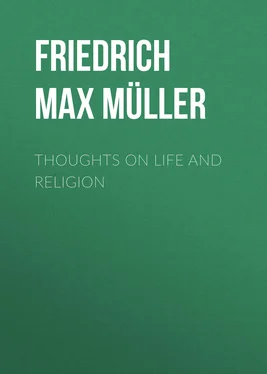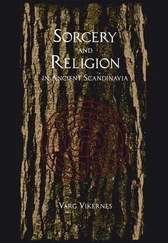Friedrich Max Müller - Thoughts on Life and Religion
Здесь есть возможность читать онлайн «Friedrich Max Müller - Thoughts on Life and Religion» — ознакомительный отрывок электронной книги совершенно бесплатно, а после прочтения отрывка купить полную версию. В некоторых случаях можно слушать аудио, скачать через торрент в формате fb2 и присутствует краткое содержание. Жанр: foreign_prose, foreign_religion, Философия, foreign_psychology, foreign_antique, на английском языке. Описание произведения, (предисловие) а так же отзывы посетителей доступны на портале библиотеки ЛибКат.
- Название:Thoughts on Life and Religion
- Автор:
- Жанр:
- Год:неизвестен
- ISBN:нет данных
- Рейтинг книги:3 / 5. Голосов: 1
-
Избранное:Добавить в избранное
- Отзывы:
-
Ваша оценка:
- 60
- 1
- 2
- 3
- 4
- 5
Thoughts on Life and Religion: краткое содержание, описание и аннотация
Предлагаем к чтению аннотацию, описание, краткое содержание или предисловие (зависит от того, что написал сам автор книги «Thoughts on Life and Religion»). Если вы не нашли необходимую информацию о книге — напишите в комментариях, мы постараемся отыскать её.
Thoughts on Life and Religion — читать онлайн ознакомительный отрывок
Ниже представлен текст книги, разбитый по страницам. Система сохранения места последней прочитанной страницы, позволяет с удобством читать онлайн бесплатно книгу «Thoughts on Life and Religion», без необходимости каждый раз заново искать на чём Вы остановились. Поставьте закладку, и сможете в любой момент перейти на страницу, на которой закончили чтение.
Интервал:
Закладка:
There is no predicate in human language worthy of God, all we can say of Him is what the Upanishads said of Him, No, No! What does that mean? It meant that if God is called all-powerful, we have to say No, because whatever we comprehend by powerful is nothing compared with the power of God. If God is called all-wise, we have again to say No, because what we call wisdom cannot approach the wisdom of God. If God is called holy, again we have to say No, for what can our conception of holiness be compared with the holiness of God? This is what the thinkers of the Upanishads meant when they said that all we can say of God is No, No.
Gifford Lectures, III.If people would only define what they mean by knowing, they would shrink from the very idea that God can ever be known by us in the same sense in which everything else is known, or that with regard to Him we could ever be anything but Agnostics. All human knowledge begins with the senses, and goes on from sensations to percepts, from percepts to concepts and names. And yet the same people who insist that they know God, will declare in the same breath that no one can see God and live. Let us only define the meaning of knowing, and keep the different senses in which this word has been used carefully apart, and I doubt whether any one would venture to say that, in the true sense of the word, he is not an Agnostic as regards the true nature of God. This silence before a nameless Being does not exclude a true belief in God, nor devotion, nor love of a Being beyond our senses, beyond our understanding, beyond our reason, and therefore beyond all names.
Gifford Lectures, III.Every one of the names given to this infinite Being by finite beings marks a stage in the evolution of religious truth. If once we try to understand these names, we shall find that they were all well meant, that, for the time being, they were probably the only possible names. The Historical School does not look upon all the names given to divine powers as simply true or simply false. We look upon all of them as well meant and true for the time being, as steps on the ladder on which the angels of God ascend and descend. There was no harm in the ancient people, when they were thirsting for rain, invoking the sky, and saying, 'O, dear sky, send us rain!' And when after a time they used more and more general words, when they addressed the powers (of nature) as bright, or rich, or mighty, all these were meant for something else, for something they were seeking for, if haply they might feel after Him and find Him. This is St. Paul's view of the growth of religion.
Gifford Lectures, III.When God has once been conceived without 'any manner of similitude,' He may be meditated on, revered, and adored, but that fervent passion of the human breast, that love with all our heart, and all our soul, and all our might, seems to become hushed before that solemn presence. We may love our father and mother with all our heart, we may cling to our children with all our soul, we may be devoted to wife, or husband, or friend with all our might, but to throw all these feelings in their concentrated force and truth on the Deity has been given to very few on earth.
Gifford Lectures, III.If the history of religion has taught us anything, it has taught us to distinguish between the names and the thing named. The names may change, and become more and more perfect, and our concepts of the Deity may become more perfect also, but the Deity itself is not affected by our names. However much the names may differ and change, there remains, as the last result of the study of religion, the everlasting conviction that behind all the names there is something named, that there is an agent behind all acts, that there is an Infinite behind the finite, that there is a God in Nature. That God is the abiding goal of many names, all well meant and well aimed, and yet all far, far away from the goal which no man can see and—live. All names that human language has invented may be imperfect. But the name 'I am that I am' will remain for those who think Semitic thought, while to those who speak Aryan languages it will be difficult to invent a better name than the Vedanta Sa k - k id-ânanda, He who is, who knows, who is blessed.
Gifford Lectures, III.However much we may cease to speak the language of the faith of our childhood, the faith in a superintending and ever-present Providence grows only stronger the more we see of life, the more we know of ourselves. When that Bass-note is right, we may indulge in many variations, we shall never go entirely wrong.
MS.We do not see the hand that takes our dear ones from us, but we know whose hand it is, whose will it is. We have no name for Him, we do not know Him, but we know that whatever name we give, He will understand it. That is the foundation of all religion. Let us give the best name we can find in us, let us know that even that must be a very imperfect name, but let us trust that if we only believe in that name, if we use it, not because it is the fashion, but because we can find no better name, He will understand and forgive. Every name is true if we are true, every name is false if we are false. If we are true our religion is true, if we are false our religion is false. An honest fetish worshipper even is better than a scoffing Pope.
MS.In the ordinary sense of knowledge we cannot have any knowledge of God; our very idea of God implies that He is beyond our powers of perception and understanding. Then what can we do? Shut our eyes and be silent? That will not satisfy creatures such as we are. We must speak, but all our words apply to things perceptible or intelligible. The old Buddhists used to say, The only thing we can say of God is No, No! He is not this, He is not that. Whatever we can see or understand, He is not that. But again I say that kind of self-denial will not satisfy such creatures as we are. What can we do? We can only give the best we have. Now the best we have or know on earth is Love, therefore we say God is Love or loving. Love is entire self-surrender, we can go no further in our conception of what is best. And yet how poor a name it is in comparison of what we want to name. Our idea of love includes, as you say, humility, a looking up and worshipping. Can we say that of God's love? Depend upon it, the best we say is but poor endeavour,—it is well we should know it,—and yet, if it is the best we have and can give, we need not be ashamed.
Конец ознакомительного фрагмента.
Текст предоставлен ООО «ЛитРес».
Прочитайте эту книгу целиком, на ЛитРес.
Безопасно оплатить книгу можно банковской картой Visa, MasterCard, Maestro, со счета мобильного телефона, с платежного терминала, в салоне МТС или Связной, через PayPal, WebMoney, Яндекс.Деньги, QIWI Кошелек, бонусными картами или другим удобным Вам способом.
1
The reader is reminded that these lectures were published in 1891, before English theologians had reached any generally received results in the study of the dates of the various parts of the Old Testament. It would be more correct now to substitute 'the Pentateuch' in the above sentence for the 'Old Testament.' For a statement of the modern views of the several periods to which the different books may be assigned, see Canon Driver's Introduction to the Literature of the Old Testament .
Интервал:
Закладка:
Похожие книги на «Thoughts on Life and Religion»
Представляем Вашему вниманию похожие книги на «Thoughts on Life and Religion» списком для выбора. Мы отобрали схожую по названию и смыслу литературу в надежде предоставить читателям больше вариантов отыскать новые, интересные, ещё непрочитанные произведения.
Обсуждение, отзывы о книге «Thoughts on Life and Religion» и просто собственные мнения читателей. Оставьте ваши комментарии, напишите, что Вы думаете о произведении, его смысле или главных героях. Укажите что конкретно понравилось, а что нет, и почему Вы так считаете.












